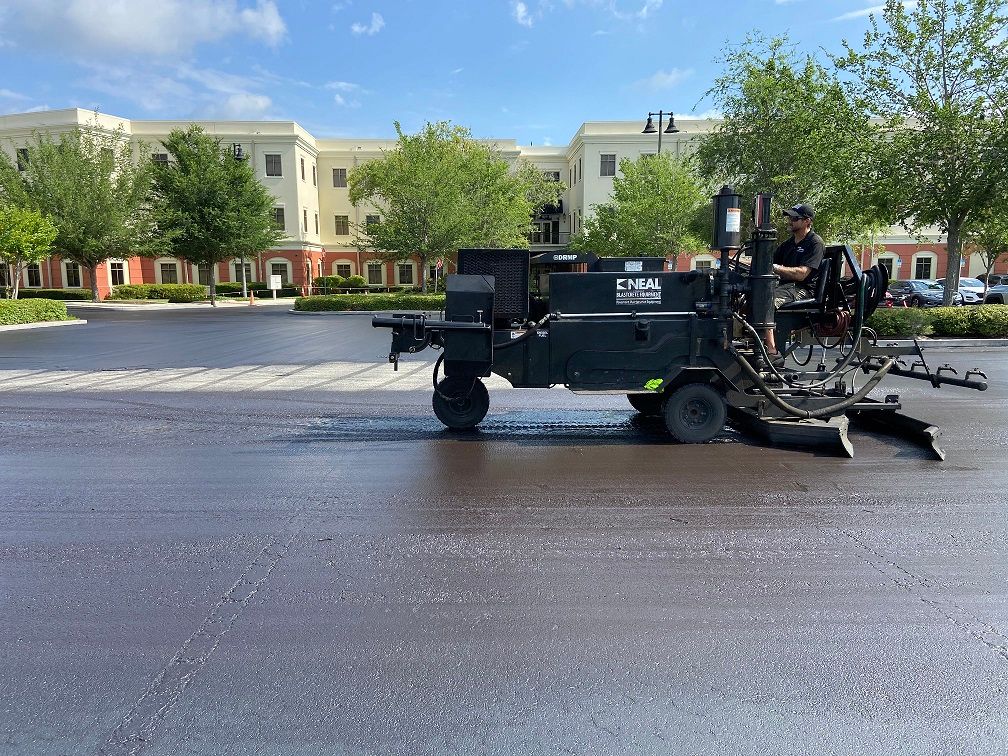

Asphalt paving projects are costly. Any business that invests in a blacktop driveway, parking lot, or other similar application probably spent a significant amount of money to make it happen. The last thing a business wants to deal with is seeing their asphalt surfaces damaged by the sweltering sun and paying more money on costly repairs or untimely resurfacing.
Luckily, you can prevent sun damage on your asphalt surfaces and save yourself time and money in the process. Besides, lengthy resurfacing projects don’t just affect your driveway or parking lot. They also can deter new customers, frustrate your clients, and inconvenience your staff. They can cause issues far beyond cutting a check to cover repair costs. Companies serious about protecting their asphalt paving in Orlando will take the needed precautions to maximize the life of their investment.
Pavement is subject to sun damage and can reach temperatures above 150 degrees on the hottest summer days. When the ambient temperature is 90 degrees, asphalt paving will register around 100 degrees. Ultraviolet rays from the sun paired with oxygen in the environment will break down the bonds that hold asphalt materials together. This process leads to disfigurement, melting, warping, cracking, deterioration, decreased flexibility, and overall wear and tear, weakening the structural integrity of your pavement.
These issues compound even further when snow, water, and other sources of moisture seep into weak spots and freeze, causing erosion of the surface layer and jeopardizing your pavement structure. Oil, gas, and other vehicle fluids also compromise your pavement's structural integrity, meaning your asphalt investment is under attack from the moment it is installed. Fortunately, sealcoating is the perfect solution to protect your paving investment from damaging elements like the sun, vehicle fluids, and other potential hazards.
Sealcoating your asphalt is a process that involves adding a layer of protection to your pavement to prevent deterioration. Water, sunlight, oxidation, oils, and chemicals are hazardous to asphalt pavement, breaking down binding materials over time and causing blacktop to become porous, brittle, and prone to potholes and cracks. However, when appropriately applied and within prescribed timeframes, sealcoating can help your pavement last as long as 30 years.
Properly applied sealcoating protects your pavement, much like a coat of wax protects your vehicle from sun damage to its paint job. It stops UV rays from baking the strength and integrity out of blacktop with anti-oxidation elements that form a protective barrier against rain, sun, and other factors that it is exposed to daily.
Sealing comes in various forms, including tire rubber modified surface sealer (TRMSS), slurry sealing, sealcoating, and micro-surfacing. Seal coats are a preventative measure with anti-oxidation materials that guard pavement against dangerous elements. In contrast, slurry seals are used instead of sealcoating to repair broken patches of pavement. Micro-surfacing uses a high-grade, fast-setting polymer with residual asphalt to fix pavement problems. Finally, TRMSS is a moisturizer for asphalt surfaces that introduces essential oils resistant to wearing down to prevent additional oxidation. Each type of sealing is designed for use in specific conditions and applications, but sealcoating is the only option to avoid damages from the elements before they happen.
Get a free, no-obligation estimate for your asphalt project. Our team is ready to help protect and enhance your property.
(407) 942-3681